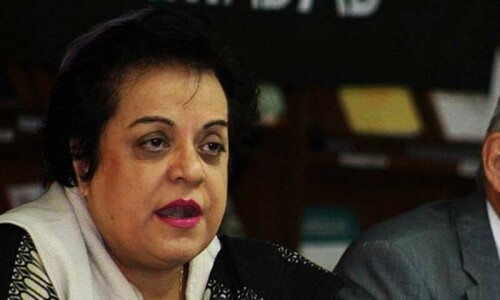 The perception that free trade and globalisation leave most people better off seems to be losing its appeal as, according to a poll, popular opinion in several countries is turning against it?
The perception that free trade and globalisation leave most people better off seems to be losing its appeal as, according to a poll, popular opinion in several countries is turning against it?
Many politicians the world over are raising serious questions about the benefits of free trade and blame it, along with globalisation, and deregulated capital flows for the myriad of economic problems and instability confronting their countries.
According to the poll, there is real public unease over the direction of the economy, but it’s not restricted to a downturn. It is also about the fact that the benefits and burdens of “the economic developments of the last few years” have not been shared fairly. Majority opinion in 27 countries holds this view –– on average 64 per cent.
In 22 out of 34 countries around the world, the popular perception is that economic globalisation, free trade and investment are growing “too quickly”, according to a BBC World Service Poll of 34,500 people made public early this month. On average, one out of two respondents holds this view. Only 35 per cent say globalisation is growing too slowly.
In the G-7 countries, from where the gospel of neo-liberal order is preached and imposed on the rest of the world, an average of 57 per cent say globalisation and free trade are growing too quickly and that their benefits are being shared unfairly. In the United States, 74 per cent respondents believe that their country’s economic conditions are worsening because of free trade and globalisation. At the heart of this belief is the massive job shift from the US (and Europe) to emerging knowledge economies, India in particular.
Many ordinary Americans have long been suspicious of free trade, seeing it as a destroyer of good-paying jobs. But it is the neo-liberal economists who have been telling them a different story, describing free trade as a great blessing and a force that creates new, higher-skilled jobs that offer better pay than those that are lost.
But, according to BusinessWeek, “something momentous is happening inside the church of free trade … and doubts are creeping in. Economists are noting that their ideas can’t explain the disturbing stagnation in income that much of the middle class is experiencing. They also fear a protectionist backlash unless more is done to help those who are losing out.”
According to the BBC poll, it is interesting to note that in some developing countries, those who complain of unfairness in distribution of growth benefits also think that globalisation is proceeding too slowly. These include Turkey, the Philippines, Indonesia, Brazil, Kenya, Mexico and the countries of Central America. In fact, few favour putting the brakes on globalisation, though many want to press them lightly. An accelerated pace of globalisation, they believe, will help break down some of the inequities in their countries.
The survey was conducted for the BBC World Service by the polling firm GlobeScan together with the Programme on International Policy Attitudes (PIPA) at the University of Maryland, between October 31, 2007 and January 25, 2008. Pakistan is not among the countries surveyed.
The correlation between the perception of economic fairness and attitudes about globalisation varies across countries. In highly developed countries such as France, Italy, Spain, South Korea, Japan, Germany, and to a lesser extent Britain and the US, the most common view is that the economy is unfair and that globalisation is going too fast. It is also true of Lebanon, Argentina, Israel and Chile.
In other eight countries, the most common view is that their economy is fair but that globalisation is moving too quickly. These include three developed countries – Australia, Canada and UAE – as well as five developing countries – Egypt, China, India, Ghana, and Nigeria.
However, nowhere the free trade and globalisation have become so unpopular among the advanced countries as in the United States. The concern is rising that the gains from free trade will never be distributed fairly among the working class and may increasingly be going to a small group at the top. For the vast majority of Americans, income growth has all but disappeared in recent years. And it’s not just the low-skilled workers who are getting excluded; the earnings have also fallen in every educational category other than those (four per cent) who hold doctorates or professional degrees.
The trend suggests that the number of Americans who are excluded from sharing the gains from trade will continue to soar. About 40 million service jobs in the US could face competition from workers in India and other low-wage nations. That’s more than a quarter of the 140 million employed in the US today. It is already having an effect on the presidential campaign.
In an interview with the Financial Times, Hillary Clinton agreed with economist Paul A. Samuelson’s argument that traditional notions of comparative advantage may no longer apply in near future. “The question of whether spreading globalisation and information technology are strengthening or hollowing out our middle class may be the most paramount economic issue of our time,” her chief economic adviser says. Barack Obama recently said, “... when I am President, I will not sign another trade agreement unless it has protections for our environment and protections for American workers.”
Central to the neo-liberal discourse on globalisation is the conviction that free trade, more than free movements of capital or labour, is the key to global prosperity. Part of the conviction comes from the belief that economic theory has irrefutably established the superiority of free trade, even though there are some formal models which show it may not be the best. Even more powerful for the proponents of free trade is their belief that history is on their side. Hence, the myth that free trade is a great American tradition. But this myth is now facing a crucial test.
History of trade in the United States shows that beginning from its first secretary of the treasury Alexander Hamilton’s “Report on Manufactures”, in which he advocated tariffs to help protect infant industries, it has been a leading nation opposed to “free trade” theory. Throughout the 19th century, key statesmen of the US continued to uphold Hamilton’s themes under the name “American System.”
The Democratic Party contested several elections over the issue of the tariff and protection of industry. The ‘free trade’ system was then called the “British System” since Britain had sufficintly developed its industry and desired to capture offshore markets through free trade.
Friedrich List, a noted German economist, said in 1885: “It is a very common clever device that when anyone has attained the summit of greatness, he kicks away the ladder by which he has climbed up, in order to deprive others of the means of climbing up after him.” It was only after the the end of the World War II, in part due to industrial supremacy and the onset of the Cold War, that the US government, along with other European nations, became a proponent of reduced tariff barriers and a defender of free trade.
When these nations were ‘developing countries’ themselves –– virtually all of today’s developed countries –– they did not practise free trade. Rather, they promoted their national industries through tariffs, subsidies, and other measures.
Particularly notable is the fact, according to Ha-Joon Chang, an eminent economist, that the gap between “real” and “imagined” histories of trade policy is the greatest in case of Britain and the United States, which are believed to have reached the top of the world’s economic hierarchy by pursuing ‘free trade.’ These two countries were, in fact, often the pioneers and the most ardent users of “interventionist” trade in their early stages of development –– something they preach the developing countries to give up.
It seems that, with the cycle of globalisation and free trade taking an unfavourable turn and benefiting some developing countries more, these nations, the US in particular, are about to revert to managed and protectionist trade.















































Dear visitor, the comments section is undergoing an overhaul and will return soon.